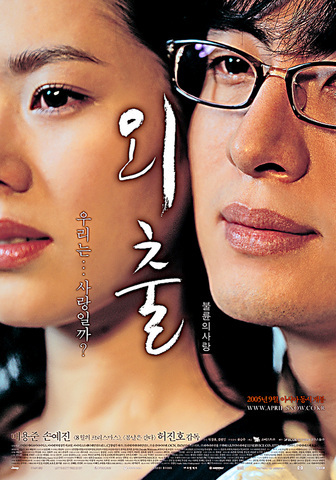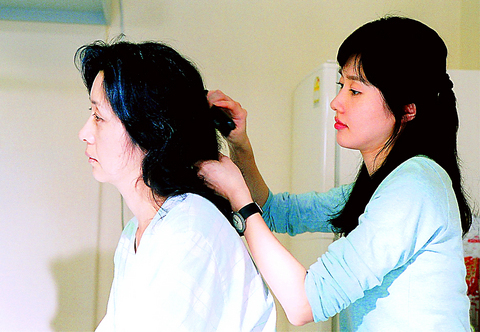The last world war ended 60 years ago, but terrorism, violence and injustice have persisted into the 21st century. Entering its fifth year the Film Festival of Peace (
based on the belief that peace is not merely a utopian idea, but a desired lifestyle.
This year, the festival has a line-up of 13 feature and documentary films from France, Canada, Israel, Germany, US, Mexico and Taiwan. Most of the award-winning films relate to war and peace, and depict peoples' lives in times of violence. The opening film Zivet je Cudo (

Zhuan Ya-han (莊雅涵) from the Peacetime Foundation of Taiwan (台灣促進和平文教基金會), said the festival will introduce a new
element this year with films examining the problems confronting immigrants to Taiwan; a poignant addition given the recent riot by Thai laborers who complained of poor working conditions in Kaohsiung.
The festival opens in Taipei tomorrow, and will move to Hsinchu, Taichung, Kaohsiung and Hualian.

Photo courtesy of Spring International, and Long Shong Pictures
Public service television will also broadcast three of the festival's films from Oct. 7 to Oct. 9.
Tickets for the festival are free and will be handed out 30 minutes prior to each screening.
However, providing members of the public with free entry has squeezed the festival's already tight budget and there will be no English subtitles for local productions or other non-English language films.
Detailed information on the films, screening venues and schedules can be found at http://www.peace.org.tw.
This week South Korean movies take the lead in entertaining mainstream audiences with love stories and fine performances by South Korean superstars. Asian megastar Bae Yong-joon (裴勇俊) ensured his latest work April Snow (外出) received widespread attention long before the film was released in neighboring Asian countries.
Bae plays a gentle man who discovers his wife's infidelity after she is severely injured alongside her paramour in a car accident. At the hospital, Bae meets the spouse of his wife's lover. Racked with hatred, anger and pain they find in each other's eyes the will to love again. After recovering the lovers return to their respective families. April Snow is a charmingly scrip-ted melodramatic story and both of the lead actors give fine performances portraying the nuanced emotions of tortured souls.
This Charming Girl (真情郵遞) is director Lee Yoon-ki's debut on the big screen and has won applause from the international festival circuit. The film tells the story of a young woman, Jeong-hae who withdraws into solitude after an unfortunate childhood. Working at a post office the lead protagonist is suffocated by her mundane life but is rescued by a writer who falls for her. The young woman gradually opens up to a world she has never dreamed of. The film is shot using a hand-held camera which constantly tracks Jeong-hae's movement. The result successfully conveys a sense of intimacy, and enables the au-dience to easily empathize with Jeong-hae's emotional condition.
Performance notes:
What: 2005 Film Festival of Peace
Where: Spot -- Taipei Film House in Taipei (台北光點); Hsinchu Municipal Image Museum (新竹影像博物館); National Dong Hwa University, Taichung (台中中興大學); Kaohsiung Film Archive (
When: Sept. 10 to Nov. 25
Tickets: Free of charge

May 18 to May 24 Pastor Yang Hsu’s (楊煦) congregation was shocked upon seeing the land he chose to build his orphanage. It was surrounded by mountains on three sides, and the only way to access it was to cross a river by foot. The soil was poor due to runoff, and large rocks strewn across the plot prevented much from growing. In addition, there was no running water or electricity. But it was all Yang could afford. He and his Indigenous Atayal wife Lin Feng-ying (林鳳英) had already been caring for 24 orphans in their home, and they were in

On May 2, Chinese Nationalist Party (KMT) Chairman Eric Chu (朱立倫), at a meeting in support of Taipei city councilors at party headquarters, compared President William Lai (賴清德) to Hitler. Chu claimed that unlike any other democracy worldwide in history, no other leader was rooting out opposing parties like Lai and the Democratic Progressive Party (DPP). That his statements are wildly inaccurate was not the point. It was a rallying cry, not a history lesson. This was intentional to provoke the international diplomatic community into a response, which was promptly provided. Both the German and Israeli offices issued statements on Facebook

Even by the standards of Ukraine’s International Legion, which comprises volunteers from over 55 countries, Han has an unusual backstory. Born in Taichung, he grew up in Costa Rica — then one of Taiwan’s diplomatic allies — where a relative worked for the embassy. After attending an American international high school in San Jose, Costa Rica’s capital, Han — who prefers to use only his given name for OPSEC (operations security) reasons — moved to the US in his teens. He attended Penn State University before returning to Taiwan to work in the semiconductor industry in Kaohsiung, where he

Australia’s ABC last week published a piece on the recall campaign. The article emphasized the divisions in Taiwanese society and blamed the recall for worsening them. It quotes a supporter of the Taiwan People’s Party (TPP) as saying “I’m 43 years old, born and raised here, and I’ve never seen the country this divided in my entire life.” Apparently, as an adult, she slept through the post-election violence in 2000 and 2004 by the Chinese Nationalist Party (KMT), the veiled coup threats by the military when Chen Shui-bian (陳水扁) became president, the 2006 Red Shirt protests against him ginned up by